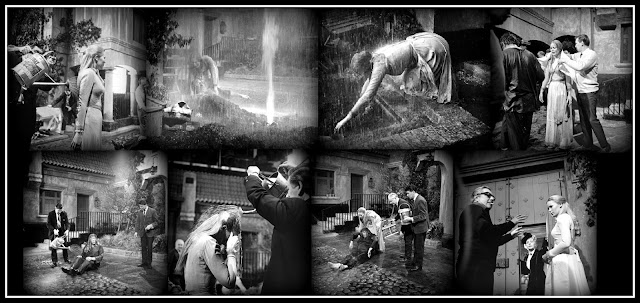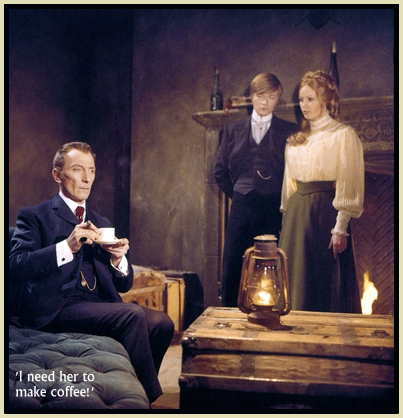After his somewhat more mellow mood in both The
Evil of Frankenstein and Frankenstein Created Woman, the Baron's personality
darkened considerably in Fisher's Frankenstein Must Be Destroyed (1969). Perhaps frustrated by his continued failed experiments, Frankenstein has never been more ruthless than in this film. Another fine cast was assembled, including Peter Cushing, Freddie Jones, George Pravda and Simon Ward, but who would be the mistresses of Frankenstein in this episode?

First and foremost was Veronica Carlson, who had
just been bitten by Christopher Lee in Dracula Has Risen From the Grave (1968)
and was being touted as 'Hammer's
new star discovery.' Aged twenty-four at
the time, Carlson had been 'discovered' by Sir James Carreras after a revealing
photo shoot for the Sun newspaper.
The statuesque blonde actress had been born in Yorkshire as Veronica Mary Glazer and had spent part of her childhood in Germany, where her father was stationed with the British Army. She later attended Thetford Girls' School and High Wycome College of Technology and Design, where she studied art and acted in several theatrical productions.
Prior to being spotted by Carreras, Carlson had appeared in the Morecombe and Wise comedy The Magnificent Two (1967) and a movie ironically titled Hammerhead (1968). An episode of The Saint' with Roger Moore in 68 also 'Crossplot' a film, again with Roger Moore also produced in 1969.
The statuesque blonde actress had been born in Yorkshire as Veronica Mary Glazer and had spent part of her childhood in Germany, where her father was stationed with the British Army. She later attended Thetford Girls' School and High Wycome College of Technology and Design, where she studied art and acted in several theatrical productions.
Prior to being spotted by Carreras, Carlson had appeared in the Morecombe and Wise comedy The Magnificent Two (1967) and a movie ironically titled Hammerhead (1968). An episode of The Saint' with Roger Moore in 68 also 'Crossplot' a film, again with Roger Moore also produced in 1969.
As Anna, the keeper of a boarding house
where Frankenstein decides to hide out and perform his experiments, Carlson has
never been better. One of the best scenes in the film - indeed, in any
Frankenstein film - features Anna having to haul a body out of a makeshift
grave in a flower garden after a water main has burst. Under Fisher's masterful
direction, the scene is as tense as anything in a Hitchcock film, and Anna ends
up completely drenched, but successful in transferring the corpse to another
hiding place so the police can't find it. It's an extraordinary scene and
Carlson is exceptional in it.
The most controversial element of Frankenstein
Must Be Destroyed is the inclusion of the infamous rape scene, in which the
Baron, overcome by lust, attacks Anna in her bedroom. Included as an
afterthought three days before the end of production and apparently demanded by
James Carreras by way of Warner Bros, the scene was ultimately cut in the US -
by Warner Bros, who had ordered it in the first place!
In her foreword to my book The Hammer
Frankenstein, Carlson recalled the incident thusly: 'We were setting the
scenes for the morning shoot on Frankenstein Must Be Destroyed when
James Carreras made a sudden, dramatic, noisy appearance. High above his head
he was brandishing sheets of paper. He snapped angrily, 'I've just been told
there's not enough sex in this picture - so here's the new scene that's just
been written!' He thrust the papers at Terry, who said simply, 'But we've set
the scene of the film - the mood - we've nearly finished shooting!' To no avail. Terry looked
through the sheets of paper whilst James Carreras made as sudden and loud a
departure as his entrance had been.
'Terry glanced round at us all, looking
straight at Peter and myself, then threw the papers into the air and abruptly
walked away, leaving the offending scene fluttering, then settling in disarray
upon the floor.
'We resolved to shoot that scene, as fans of
Hammer know. But I've always felt that it undermined the essence of just what
defined "Frankenstein." He was by definition the essence of a truly
asexual man, driven single-mindedly in his torment to form an animate creature
- especially Man.'
With all due respect to Veronica, whom I've been
fortunate enough to call a friend for over 25 years, there was certainly
nothing asexual about Frankenstein in The Curse of Frankenstein. He may
have ignored his beautiful fiancee, but he had impregnated his maid. The rape
scene in Frankenstein Must Be Destroyed is not really out of character. Hammer's
Baron had been a murderer (and something of a lecher) from the very first film.
Now he was a rapist as well. It really wasn't that much of a leap.
The Baron has never been more of a misogynist
than he is in Frankenstein Must Be Destroyed. From the time he first
meets her, he treats Anna like chattel. When her boyfriend Karl (Ward) pleads
to Frankenstein, 'You don't need Anna,' the Baron sniffs, 'I need her to make coffee!'
In that context, the rape scene can be seen to make sense as the logical outcome of a master/slave relationship. During the history of the series, Frankenstein has had only one 'normal' relationship with a woman - the one with Justine. But with the maid murdered by his Creature - and by proxy, by Frankenstein himself - the Baron's sex drive has been suppressed in favour of his experiments, making him not only increasingly deranged, but more dangerous and unpredictable as well.
In that context, the rape scene can be seen to make sense as the logical outcome of a master/slave relationship. During the history of the series, Frankenstein has had only one 'normal' relationship with a woman - the one with Justine. But with the maid murdered by his Creature - and by proxy, by Frankenstein himself - the Baron's sex drive has been suppressed in favour of his experiments, making him not only increasingly deranged, but more dangerous and unpredictable as well.
JOIN US : HERE






















